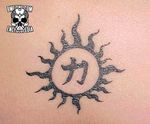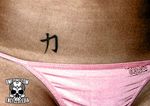Strong Kanji
In part because it was featured in the movie Pretty Woman, the kanji symbol "chikara" (also ryouku or riki), or "strength" is one of the most popular kanji tattoos in Western culture. However, like so many kanji tattoos its meaning is often mangled, where it is used to mean anything from strength of the heart (as it did in the movie), to energy, wisdom, power, skill, and so on. While the word has broadened in meaning in modern times to include "inner strength", strictly speaking it means "physical strength."
The character for chikara was created thousands of years ago as a pictorial representation of bulging veins on a man's arm as it pushed down with strength. If you want to be specific as to what form of strength you're referring to, you can combine the symbol with another — for example, kokyû-chikara means "inner power" (kokyû meaning breath).
That said, most people don't really care what the actual meaning of the symbol is, and concern themselves more with what it means to them.


